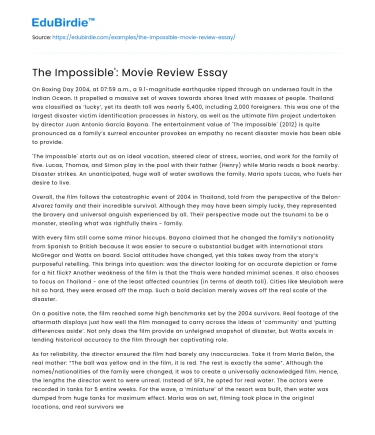On Boxing Day 2004, at 07:59 a.m., a 9.1-magnitude earthquake ripped through an undersea fault in the Indian Ocean. It propelled a massive set of waves towards shores lined with masses of people. Thailand was classified as ‘lucky’, yet its death toll was nearly 5,400, including 2,000 foreigners. This was one of the largest disaster victim identification processes in history, as well as the ultimate film project undertaken by director Juan Antonio García Bayona. The entertainment value of 'The Impossible' (2012) is quite pronounced as a family’s surreal encounter provokes an empathy no recent disaster movie has been able to provide.
'The Impossible' starts out as an ideal vacation, steered clear of stress, worries, and work for the family of five. Lucas, Thomas, and Simon play in the pool with their father (Henry) while Maria reads a book nearby. Disaster strikes. An unanticipated, huge wall of water swallows the family. Maria spots Lucas, who fuels her desire to live.
Save your time!
We can take care of your essay
- Proper editing and formatting
- Free revision, title page, and bibliography
- Flexible prices and money-back guarantee
Overall, the film follows the catastrophic event of 2004 in Thailand, told from the perspective of the Belon-Alvarez family and their incredible survival. Although they may have been simply lucky, they represented the bravery and universal anguish experienced by all. Their perspective made out the tsunami to be a monster, stealing what was rightfully theirs - family.
With every film still come some minor hiccups. Bayona claimed that he changed the family’s nationality from Spanish to British because it was easier to secure a substantial budget with international stars McGregor and Watts on board. Social attitudes have changed, yet this takes away from the story’s purposeful retelling. This brings into question: was the director looking for an accurate depiction or fame for a hit flick? Another weakness of the film is that the Thais were handed minimal scenes. It also chooses to focus on Thailand - one of the least affected countries (in terms of death toll). Cities like Meulaboh were hit so hard, they were erased off the map. Such a bold decision merely waves off the real scale of the disaster.
On a positive note, the film reached some high benchmarks set by the 2004 survivors. Real footage of the aftermath displays just how well the film managed to carry across the ideas of ‘community’ and ‘putting differences aside’. Not only does the film provide an unfeigned snapshot of disaster, but Watts excels in lending historical accuracy to the film through her captivating role.
As for reliability, the director ensured the film had barely any inaccuracies. Take it from María Belón, the real mother: “The ball was yellow and in the film, it is red. The rest is exactly the same”. Although the names/nationalities of the family were changed, it was to create a universally acknowledged film. Hence, the lengths the director went to were unreal. Instead of SFX, he opted for real water. The actors were recorded in tanks for 5 entire weeks. For the wave, a ‘miniature’ of the resort was built, then water was dumped from huge tanks for maximum effect. María was on set, filming took place in the original locations, and real survivors were hired as extras. With such insignificant tweaks to the original story, the film should be considered a reliable source for those who wish to explore the 2004 Indian Ocean tsunami. The tsunami was masterfully recreated, and everything, down to the hospital beds, was historically accurate.
Indeed, 'The Impossible' is yet another film that places its entertainment value before its historical. There is no sugar coating when it comes to the fact that 'The Impossible' does not grasp the real scale of the disaster. It chooses to portray a single family’s experiences, which in turn provides a good, yet limited perspective. Although, I cannot deny that the film is something short of a masterpiece. In fact, the film should not only be valued as a historical source. Seeing as the emotions, sense of community, and sensations experienced by victims were all sensationally displayed in the film, it should also classify as an explanatory source of human interaction and psychological response.
Time for the verdict. My opinion of the film remains unchanged from the claims of whitewashing/racism that the film received. 'The Impossible' shows a powerful, humbling story of fear, love, and loss. Bayona was right to say that sometimes survival is harder than death. The creation of water scenes, the hiring of survivors, and filming in original locations all unite to form a brilliantly executed movie. Perhaps at times it degraded the scale of the event, but as far as the storyline goes, it was unfathomable and impossible.






 Stuck on your essay?
Stuck on your essay?

